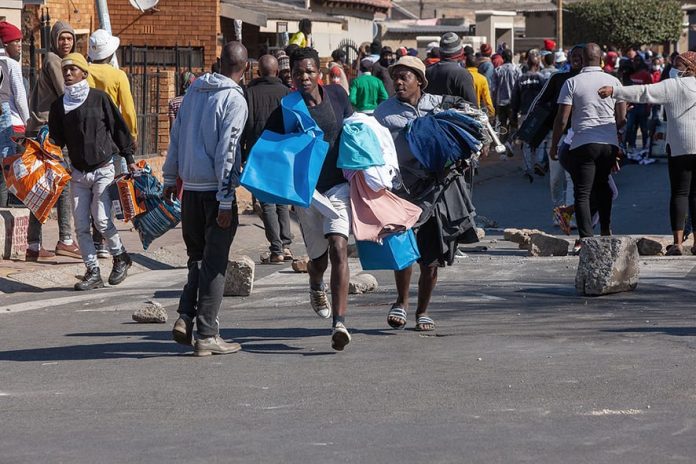Johannesburg – The South African Pharmacy Council reported that 121 pharmacies in KwaZulu-Natal and Gauteng had been destroyed and looted and that Covid-19 vaccines and other medicines were stolen in the process.
Vincent Tlala, Registrar/CEO of the South African Pharmacy Council said while there was standing measures in place within its legislation, especially the Rules relating to Good Pharmacy Practice (GPP), the current situation has demanded them to work closely with other health regulators, the Department of Health, and pharmacies in the manufacturing and wholesale sectors.
To ensure continued access affected pharmacies have been directed to ensure that they put measures in place to ensure that their chronic medicines patients continue to have access to their medicines to manage conditions such as diabetes, hypertension, and HIV, amongst others.
This will be achieved through home delivery services or referring patients to nearby pharmacies that are operational.
“Together with the National Department of Health and other health regulators including the South African Health Products Regulatory Authority (SAHPRA), Health Professions Council of South Africa (HPCSA), South African Nursing Council (SANC), and Office of Health Standards Compliance (OHSC), the SAPC is working with medicines manufacturers, wholesalers, and health care practitioners to ensure that access to medicines is restored to the affected areas,” Tlala said.
While we know that the 10 public sector wholesale pharmacies (depots) are not negatively impacted and are still able to provide medicines to public sector hospitals, pharmacies and clinics, the private sector is affected as access points for patients (pharmacies) have been destroyed. The 173 private wholesale pharmacies around the country will be immediately available to start distribution of medicines to affected areas as soon as order has been restored,” Tlala further added.
He stressed that the 121 affected community pharmacies, , as at Friday, 16 July 2021, may take time to recover, if some of them recover at all.
“Where records such as chronic medicine prescriptions have been lost and destroyed, prescribers such as doctors will work with pharmacists to issue copies of patient prescriptions. Furthermore, patients will be able to access emergency 30-day supply of medicines at an alternative pharmacy, once it has been ascertained that they had a previous prescription that was dispensed by an affected pharmacy. Digital/computer records stored remotely for chronic patients will also come in handy in ensuring that patients continue to have access to medicines.”
He said in addition the SAPC has been in touch with stakeholders in the medicine supply chain, some courier pharmacies have indicated that they have sought the services of private security firms to escort deliveries while others have committed to ensuring continued supply to unaffected pharmacies in KwaZulu-Natal especially by using flight courier.
All wholesalers will resume road distribution of medicines as soon as the situation has been brought under control. Gauteng has not been badly impacted in terms of the road freight of medicines.
On Friday the Gauteng Provincial Government as of Thursday, the total in-hospital patient admissions were 9063 (3 429 for the Public Sector; and 5 634 for the Private Sector) and that there was severe pressures on bed availability, especially in Johannesburg, West Rand and Tshwane districts.
“Over past few days, hospitals have experienced an increase in accidents and emergencies cases due to civil unrest,” read the statement. They said they anticipated that there will be increased demand following the super spreader civil unrest.
“Contingency measures have been reactivated to ensure that additional beds are availed through deferring of elective procedures to a later date. Additional beds continue to be repurposed with staff in ABT and non-ABT facilities especially in districts with increased hospitalisations.”
The Provincial government said that although scientists have said the numbers of Covid-19 patients are starting to drop in Gauteng, the drop is not enough.
“The province is concerned that there might be a change in the downward trajectory of new COVID-19 infections due to recent protest actions.
“These protests might cause the province to take longer to flatten the curve.”
Also read: Cry, the beloved black economy
Follow @SundayWorldZA on Twitter and @sundayworldza on Instagram, or like our Facebook Page, Sunday World, by clicking here for the latest breaking news in South Africa. To Subscribe to Sunday World, click here.
Sunday World



